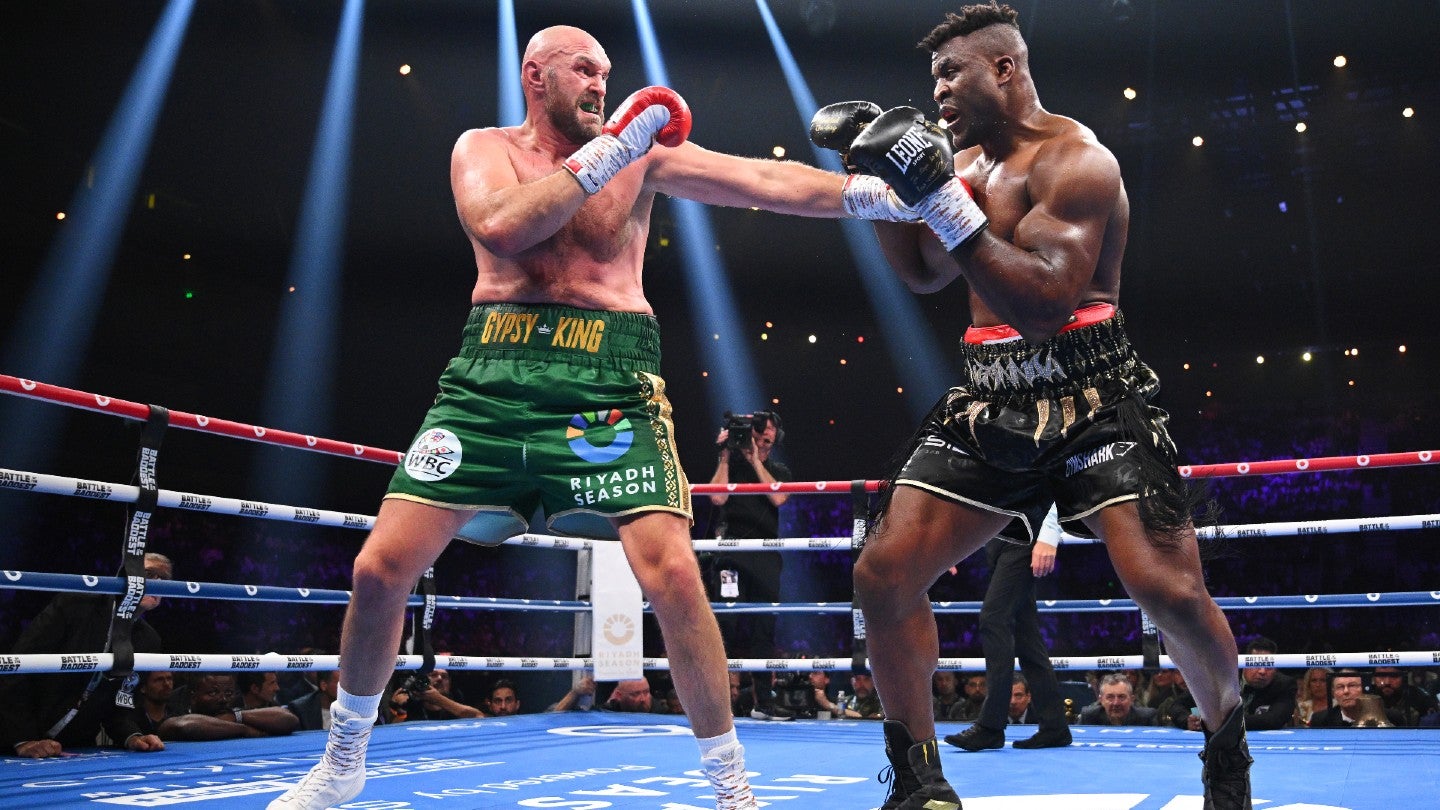
Tyson Fury, one of the biggest names in boxing, with the WBC heavyweight title and an undefeated record to his name, became the latest boxer to prioritize a big payday over sporting legacy.
The fight with mixed martial arts (MMA) star, Francis Ngannou came shortly after the younger Fury brother, Tommy, emerged victorious in his second influencer crossover fight against YouTuber, KSI.
Tyson Fury, known as ‘the Gypsy King’, reportedly collected around $50 million for his recent fight against Ngannou. The MMA star himself is also reported to have pocketed around $10 million for the fight, earning handsomely more than any of his previous MMA fights.
For the fighters, it was a win-win situation. An easy sell with both boasting big followings in their respective sports and guaranteed money on offer thanks to their Saudi Arabian hosts.
They were jumping on a trend that has truly been gathering steam in recent years, largely thanks to the growing world of influencer boxing, where the lines between sport and entertainment have been blurred. Tyson’s own half-brother, Tommy, has been involved in two such high-profile bouts against Jake Paul and KSI respectively, despite only being at the early stages of his professional career.
Much to the surprise of many in attendance and watching around the world, Tyson Fury endured a much more challenging bout against Ngannou.
Looking far from his best, there was widespread shock at the heavyweight world champion even getting the judges’ decision, as the Cameroonian sportsman proved himself a worthy competitor, despite the crossover handicap and having not competed (in MMA) since January 2022.
The signs that this was being viewed as a smash-and-grab exercise were obvious even before the first bell when Team Fury announced agreed terms for the much-anticipated heavyweight unification fight against Ukrainian Oleksandr Usyk.
A unification fight in the premium weight category has been a large source of frustration for fight fans for decades, with no one unified champion since Lennox Lewis in 2000, and plenty of such big fights never materializing between the likes of Fury, Anthony Joshua, and Deontay Wilder in recent years.
With the Fury-Usyk fight announced, it offered hope to fans that these premier fights could be made. Fury had previously claimed Usyk could not get out of a December showdown with him but after the tough fight endured against Ngannou, the fighter and his team were quick to shut down the possibility of a December date.
Frank Warren, Fury’s promoter, has claimed March/April could be a more realistic date, giving Fury’s body time to recover. The chance to pass up supposed easy money in this crossover fight looks to have cost Fury and, more importantly, boxing fans, a 2023 unification fight.
It would rank as yet another postponement of a highly sought-after fight that many feared would never materialize.
Boxing has long struggled to make the biggest fights happen because of promoter/broadcaster/scheduling conflicts. Whilst the emergence of influencer boxing has drawn new eyeballs to the sport, it has too easily drawn a spotlight on the issues that plague professional boxing.
The influencer fight events attract packed crowds across the entire undercard, most professional fight nights are only at full capacity with ticket sales for the main event.
Boxing does not do enough to promote or stack its cards, with the main event deemed enough to claim ticket sales and attract TV audiences. Influencer boxing is built on followed (or manufactured) online rivalries/grudges that fans engage and interact with.
This ability to grow a feud online builds the profile of the influencers and generates real excitement when exhibition fights are later made, and these are the only fights that are staged.
Most professional boxing bouts are far from this, with fighters forced to compete against mandatory ‘rivals’ or engage in fights with little suspense over the outcome.
The biggest fights are not being made and at the end of the day, boxing remains a brutal form of entertainment, but it is forgetting the entertainment part, something influencer and celebrity crossover fighting has kept at the heart of its promotion.
Boxing has shown little to nothing to suggest that anything is being done to evolve the sport and take heed of these exhibition fights and its fans can seemingly expect the same frustration with sought-after fights continuing to not materialize.
The influencer scene, on the other hand, appears set to stay for the foreseeable future and is continuing to evolve, offering valuable lessons to the world of professional boxing.
Some professional boxers may see the crossover fights with other sports stars and influencers as an attempt to evolve and attract new fans but it is diluting the competition.
Entertaining these gimmick fights challenges the integrity of the sport, as boxing struggles to understand its own identity moving forward because of the issues it faces.
Image: Justin Setterfield/Getty Images



